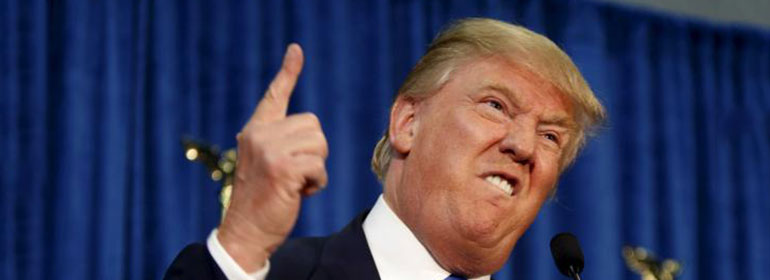Trump has come to power and Britain voted to leave the EU in a new era of communication, but that doesn’t mean the bad guys are necessarily having it all their own way.
If you’re reading this, then Donal Trump didn’t press the big red button marked ‘Do Not Press’ on his first day in the White House. It saved us his live-tweeting of Armageddon anyway.
The apocalyptic pronouncements and opinion pieces in pretty much all of the media that wants us to take it seriously – Times newspapers around the world, including our own, The Guardian, CNN, etc – would have you believe this was something that could happen.
Maybe he pushed the button in a fit of pique because another Hollywood star made a perfectly impassioned speech about what a low-class person he is (the SAGs are on January 29 and then the Oscars on February 26 – imagine if an ill-advised Jennifer Lopez red carpet look was the last thing you saw before the sky went suddenly bright in the east).
Truthiness Isn’t New
A lot of the commentators have been talking about ‘new’ concepts like ‘post-truth’ or ‘truthiness’, but they’re not so new really. What is new is the means of communicating notions to voters that effectively persuade them to buy what you’re selling. To use a hackneyed but more truthy than ever phrase, the medium is the message.
History has plenty of instances of huge upheavals that happened when a new media technology became widespread. The printing press gave us the Reformation, one of the results of which was Europe’s first total conflict – the Thirty Years War, with eight million dead.
Cheap books, combined with the literacy demanded of its workers by industrialisation, opened the way for the mass production of newspapers (and latterly radio), many published by press barons far nastier than the Donald. Without their help, how would it have been possible to glorify nationalism and the concept that ‘we’, from the lowliest farm labourer to the sons of aristos (but mostly the former) were engaged in a vaguely but heroically described struggle to future-proof ‘our’ nation against those who would consign it to the dust? Two world wars later and the media could say ‘told you so’ and move into a lucrative golden age that lasted right up until now.
Mediated Upheaval
Now, of course, we’re just at the start of the biggest mediated upheaval ever. Everyone got excited that the digital age would take control of media from big corrupted companies (in the west) or from government (in other places) and a gloriously anarchic era of direct communication of every viewpoint possible would be the result.
That happened, but like an ecosystem thrown out of equilibrium, the massive, brain-swamping increase in demand for our attention has had unpredicted effects, changing how each of us processes all of those competing ideas about what is ‘really’ happening.
When it comes to effective communication in this new world, Trump and his backers have an advantage: as populists, facts and truth don’t have any essential value. At best, objective truth is manipulated to enhance their standing and create doubts about their opponents – this is usual election practice and everyone does it, to a degree. The populists go one further, and this is where their natural understanding of the shallowness of how we engage with the world through the new media comes into play.
Rabble-Rousing Propaganda
They know that objective truth, expressed in dull statistics, counterintuitive facts or TLDR verbiage, doesn’t ring loudly in our individually curated echo chambers, so instead, they tell us things that sound true – clear and simple, truthy soundbites.
Can’t get a job? That’s because the liberal/lefty government lets too many immigrants in. Think society is immoral? That’s because women can have abortions and gays can get married. What happened to Toblerone? Globalisation.
Post-truth and truthiness aren’t new things; they’re rabble-rousing propaganda given new power for this new era of populism. Closer to home, Brexit is likely to become a textbook example of propaganda in action.
What’s shocking isn’t that the Leave side won, but that the Remain establishment didn’t see it coming – you can only hope that other European governments have better luck with their media teams.
Yes Equality
But it’s not all despair: a campaign with truthy soundbites and both rational and emotional appeals can work in our favour too. The 2015 marriage equality campaign used objective truth – letting gays marry won’t make any difference
to you if you aren’t getting gay-married – to undermine the opposition and their invective.
It also used populist truthiness – come with us on this national journey to a better future – to get into enough echo chambers to take the vote over the line.
As any of the Yes campaign will tell you, it wasn’t easy, the media campaign was executed with unusual-for-Ireland precision, but it did show that in the new era of communication, the bad guys don’t necessarily have it all their own way.
Stephen Meyler’s article on Truthiness was originally found in the February 2017 Issue of GCN (Issue 326) which is available to read here.
© 2017 GCN (Gay Community News). All rights reserved.
